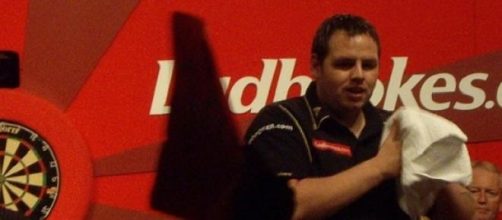The World Cup of Darts came to a fabulous conclusion on Sunday in Frankfurt, Germany, as the top seeds England and Scotland faced each other in a dramatic final. After the highly fancied Dutch pairing went out in the semis, the stage was set for England's Phil Taylor and Adrian Lewis to take on Scotland's Gary Anderson and Peter Wright. In a tense final, the result went right down to the wire before England won 3-2.
Thirty-two countries contested the four-day tournament, with each nation represented by two players, the highest ranked players on the PDC rankings for each country.
In round one the legs were played out in the doubles format, each player alternating turns at the oche, with the first country to five legs winning the match.
Thereafter up to the final, the format changed to two singles matches, the first player to four legs winning their game. If the singles were shared, then a deciding doubles match was played.
England's run
England were the champions in 2012 and 2013, featuring the trusted duo of Taylor and Lewis, with 18 world titles between them. They began by whitewashing Denmark 5-0 and were just as conclusive in round two, knocking Japan out 2-0. Despite strong local support, Germany fared no better in the last-eight, losing 2-0 to the favourites.
Scotland's progress
Scotland had been equally commanding on their way through to the semis. A first round victory over Singapore 5-1 was proceeded by a 2-0 success over Hungary in round two. Hong Kong succumbed 2-0 in the quarter-finals.
Semi-finals
With the preliminary rounds concluded, the last-four clashes included Belgium (seeded 5th), who sneaked in after a 2-1 quarter-final success over the 4th seeded Australians:
-
England (1) v Belgium (5)
-
Scotland (2) v Netherlands (3)
England won two tight singles matches against Belgium's Huybrechts brothers, sealing their final's place with a 2-0 victory. Taylor beat Ronny 4-3, before Lewis overcame younger brother Kim 4-2.
The second semi-final was even closer, with world number one Michael van Gerwen partnering the five-time world champion Raymond van Barneveld in the Dutch team. They shared the singles games: van Gerwen winning 4-3 against Wright; Anderson being a clear 4-1 winner over van Barneveld. The Scots romped to a 4-1 success in the deciding doubles match to put the Dutch out.
The final
The final proved to be a fitting finale. In many ways the format resembled the Davis Cup in tennis, with two singles games, a doubles game and then two further singles to complete the drama if required. The first team to three points would lift the title.
Taylor started in scintillating form, whitewashing Wright 4-0 and posting a three-dart average of 113.43, a record for the World Cup.
Anderson was almost as convincing, levelling the scores with a 4-1 victory over Lewis.
Into the doubles, which the more experienced pairing of the English duo edged 4-3 but only just. Taylor appeared to have hit the wrong treble on his way to a 101 checkout, but gathered himself to hit double 4.
The match was extended into the deciding singles tie, after Anderson produced a stunning display with an average of 108.04 to overcome Taylor 4-1. Leg 3 proved to be crucial, as Taylor set up double top to break the throw, only for Anderson to complete a 150 check-out on double 15 to take the leg instead.
Lewis was to hold his nerve in his singles battle with Wright though, winning the game 4-1 with a 14-dart finish in the last leg to clinch the title for England.
